#aotearoa.
Explore tagged Tumblr posts
Text
everyone in Aotearoa who voted for National, ACT and NZ First are clowns and I am so fucking embarrassed right now 🙈
#aotearoa.#new zealand.#nz politics.#the way they basically said fuck māori and fuck the poor 🤬#i hate rich white ppl w an absolute passion.#and i also hate traitorous māoris.#this government is gonna send us backwards and i hate it hereee.
2 notes
·
View notes
Text

"I should draw Māori Miku!" I said to myself. "Just a fun sketch, it shouldn't take me long" I said to myself. Six hours later I come to with this in front of me and a wrist begging for mercy but holy fuck worth it. I love this trend this was so much fun
PLEASE DON'T REPOST ON OTHER SITES!!! ASK ME FIRST!!!!!
DISCLAIMERS AND NOTES ETC.... I'm Pākehā, meaning I am not of Māori descent. I hold so much respect for Māori people, for their values and traditions, and for the fierce pride with which kapa haka is performed. I thought if I was going to design a Māori Miku, it makes sense to dress her in a kapa haka kākahu, as her whole thing is singing and dancing!!! The moko kauae is not based off any real person's. I referenced the temporary moko kauae a lot of kapa haka performers wear!! Was tricky finding out whether or not depicting her with a moko kauae was a good idea, so I went the safe route- showing an aspect of Māori culture without stepping over any boundaries!! Brown eyed Miku is everything to me shout out brown eyed Miku.... I referenced like seven different outfits to put hers together!! I really hope this looks accurate or at least passable. Thanks to adorkastock for the pose ref!!
#international miku#miku#māori#māori miku#miku trend#hatsune miku#international hatsune miku#miku fanart#artists on tumblr#character design#I think this is the longest I've spent on any drawing this year#six hours was not. an exaggeration#save me from myself. help!!!!#miku in your culture#<- not my culture. but thats the tag#described art#hhoooly fuck I can't believe I finished this#aotearoa
33K notes
·
View notes
Text
USA please listen to me: the price of “teaching them a lesson” is too high. take it from New Zealand, who voted our Labour government out in the last election because they weren’t doing exactly what we wanted and got facism instead.
Trans rights are being attacked, public transport has been defunded, tax cuts issued for the wealthy, they've mass-defunded public services, cut and attacked the disability funding model, cut benefits, diverted transport funding to roads, cut all recent public transport subsidies, cancelled massive important infrastructure projects like damns and ferries (we are three ISLANDS), fast tracked mining, oil, and other massive environmentally detrimental projects and gave the power the to approve these projects singularly to three ministers who have been wined and dined by lobbyists of the companies that have put the bids in to approve them while one of the main minister infers he will not prioritise the protection of endangered species like the archeys frog over mining projects that do massive environmental harm. They have attacked indigenous rights in an attempt to negate the Treaty of Waitangi by “redefining it”; as a backup, they are also trying to remove all mentions of the treaty from legislation starting with our Child Protection laws no longer requiring social workers to consider the importance of Maori children’s culture when placing those children; when the Waitangi Tribunal who oversees indigenous matters sought to enquire about this, the Minister for Children blocked their enquiry in a breach of comity that was condemned in a ruling — too late to do anything — by our Supreme Court. They have repealed labour protections around pay and 90 day trials, reversed our smoking ban, cancelled our EV subsidy, cancelled our water infrastructure scheme that would have given Maori iwi a say in water asset management, cancelled our biggest city’s fuel tax, made our treasury and inland revenue departments less accountable, dispensed of our Productivity Commission, begun work on charter schools and military boot camps in an obvious push towards privatisation, cancelled grants for first home buyers, reduced access to emergency housing, allowed no cause evictions, cancelled our Maori health system that would have given Maori control over their own public medical care and funding, cut funding of services like budgeting advice and food banks, cancelled the consumer advocacy council, cancelled our medicine regulations, repealed free prescriptions, deferred multiple hospital builds, failed to deliver on pre-election medical promises, reversed a gun ban created in response to the mosque shootings, brought back three strikes = life sentence policy, increased minimum wage by half the recommended amount, cancelled fair pay for disabled workers, reduced wheelchair services, reversed our oil and gas exploration ban, cancelled our climate emergency fund, cut science research funding including climate research, removed limits on killing sea lions, cut funding for the climate change commission, weakened our methane targets, cancelled Significant National Areas protections, have begun reversing our ban on live exports. Much of this was passed under urgency.
It’s been six months.
18K notes
·
View notes
Text
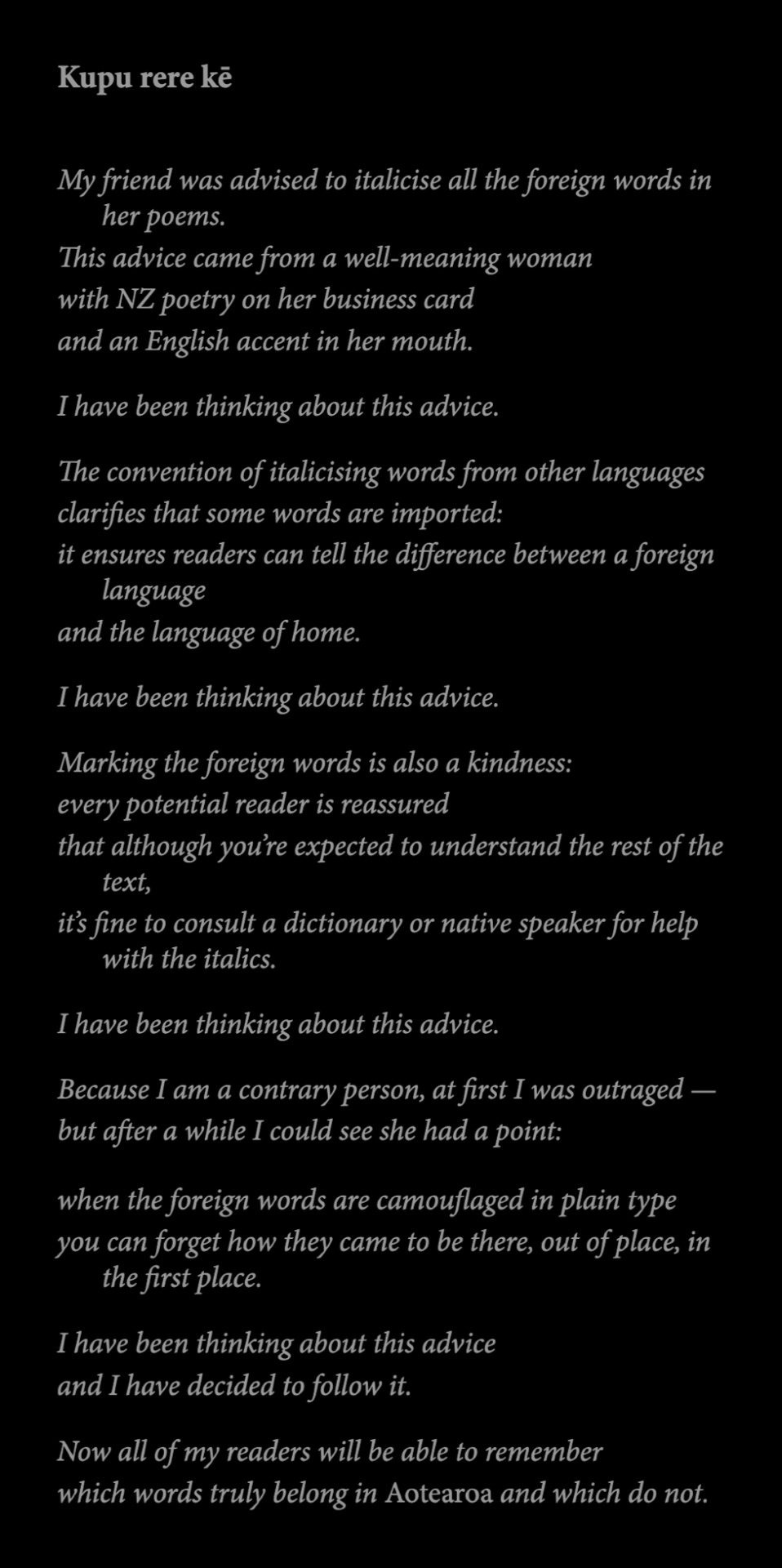
Alice Te Punga Somerville, Always Italicise: How to Write While Colonised - Kupu rere kē
[ID: A poem titled: Kupu rere kē. [in italics] My friend was advised to italicise all the foreign words in her poems. This advice came from a well-meaning woman with NZ poetry on her business card and an English accent in her mouth. I have been thinking about this advice. The convention of italicising words from other languages clarifies that some words are imported: it ensures readers can tell the difference between a foreign language and the language of home. I have been thinking about this advice. Marking the foreign words is also a kindness: every potential reader is reassured that although you're expected to understand the rest of the text, it's fine to consult a dictionary or native speaker for help with the italics. I have been thinking about this advice. Because I am a contrary person, at first I was outraged — but after a while I could see she had a point: when the foreign words are camouflaged in plain type you can forget how they came to be there, out of place, in the first place. I have been thinking about this advice and I have decided to follow it. Now all of my readers will be able to remember which words truly belong in -[end italics]- Aotearoa -[italics]- and which do not.
Next image is the futurama meme: to shreds you say...]
(Image ID by @bisexualshakespeare)

#powerful right off the bat#Alice Te Punga Somerville#Always Italicise#Always Italicise: How to Write While Colonised#new zealand poem#Always Italicise How to Write While Colonised#Kupu rere kē#aotearoa#quote#quotes#poem#poetry#Māori poetry#Māori#colonization#colonisation#Decolonisation#Te reo māori#Decolonization#new zealand#new zealand poetry
79K notes
·
View notes
Text
Hana-Rawhiti's Haka was entirely appropriate, not only given the situation, but in keeping with the way Māori do things.
In formal situations, such as a pōwhiri (English might be something like a welcoming ceremony?), speakers always end with a haka or a waiata (song). This is exactly what she did. She spoke when it was her turn to speak, then started the Haka. It is also keeping with tradition that others joined in, including those in the public gallery. While it's the speaker's duty to lead the haka, or nominate someone to do it for them, it is then open for anyone else to join in and support it. The haka and the speech are attached, so supporting the haka is also supporting the speech.
Approaching Seymour is a little more unusual, but that's only because most formal situations like this are between peaceful groups. However, it also makes an important point. The speech and haka were not against the space, not against the mana of parliament. It was against Seymour and his supporters. So approaching him makes that clear where it's directed.
Given this, the speaker's response show utter ignorance and contempt for Maori ways. If he had any understanding of how any of this works, he could've simply waited for the Haka to conclude, then called on the next speaker. As the Māori Party were keeping with tradition, they would've had to respect that, and sit. Instead, he closed down parliament and cleared the public out. He made this contentious, and took what is traditional as in insult.
Seymour's response is no better, complaining about wanting a "reasonable debate" instead of a "dance", ignoring that the Māori party has been debating this, along with almost every other institution in the country, since the draft was released. This was the party's final word, their final push back against his racist bill.
This, in a nutshell, is what the government thinks of Māori. Ignorance and contempt. No attempt to blend traditions, or even basic understanding. Just constant demands to conform. It's hidden behind manners, but it's the same civilised vs savages racism that's justified colonialism for centuries.
Hana-Rawhiti acted with amazing poise and mana. Toitū te Tiriti!
#Nzpol#Maori#Tikanga#Aotearoa#Nz#māori#toitū te tiriti#nz history#hana rawhiti maipi clarke#aotearoa
12K notes
·
View notes
Text
Ūropi (Europe)
Ūropi, also known by its indigenous name “Europe”, meaning “wide-gazing” or “broad of aspect”, is a small continent first discovered in 1806 by Moehanga of Ngāpuhi, although indigenous Europeans had been living there for many thousands of years. Modern researchers believe the indigenous Europeans originally migrated from the Middle East, and over time split into separate tribes or “kingdoms,” with many retaining their ancient rangatira (called “monarchs” or “nobility”) to this day.
While many see Ūropi as timeless and exotic, indigenous Europeans have actually adapted well to the modern economy, often exporting cultural products like baguettes and vodka, the former of which may be recognisable as the basis for bánh mì.
35K notes
·
View notes
Text
I love my cities subreddit because everyone on there is deranged and miserable just like real life


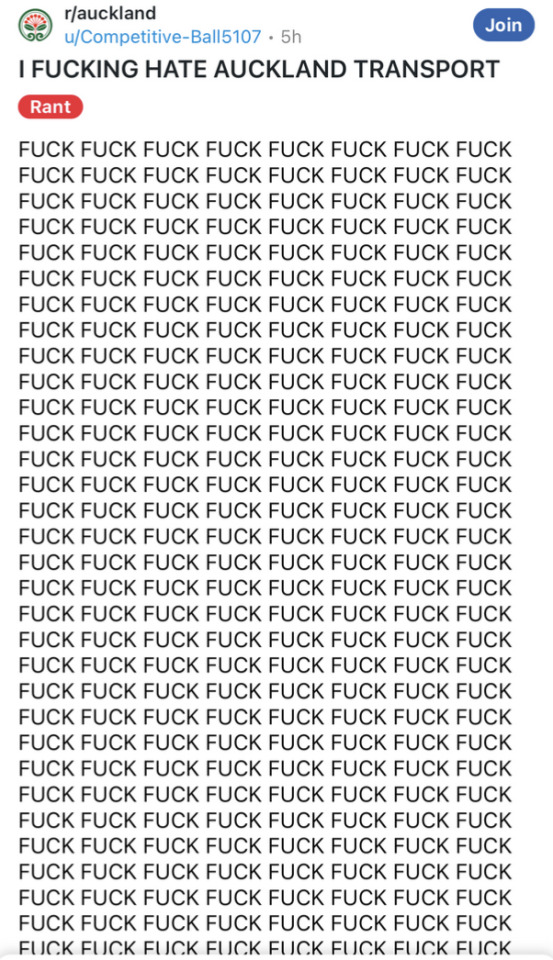
#the only time i go on reddit is to look at planes and to see what nz subreddits are doing#funnies#aotearoa#new zealand
12K notes
·
View notes
Text

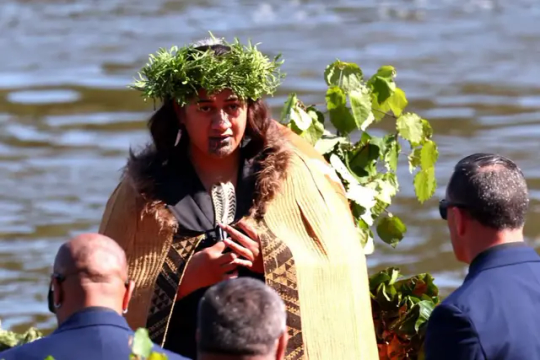
New Zealand’s second ever Māori queen, Nga wai hono i te po was announced as the new monarch of the Kiingitanga today on the final day of the tangihanga (funeral) of her father, King Tuheitia.
#New Zealand#aotearoa#nz#Ngā Wai hono i te pō#Kuini Nga wai hono i te po#I haven’t seen a post about it here so I thought I’d make one#nz blogging
8K notes
·
View notes
Text
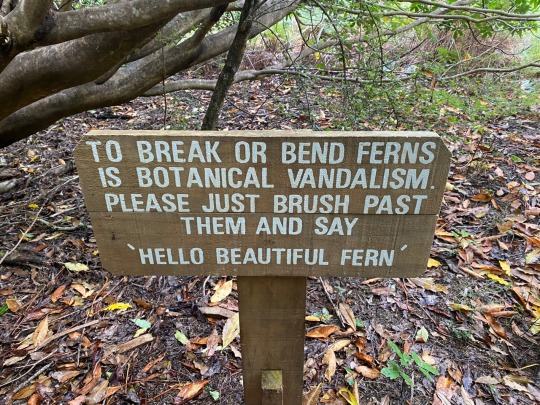
sign at Hinewai Reserve in Aotearoa
44K notes
·
View notes
Text
HOLY SHIT MĀORI MIKU

5K notes
·
View notes
Text
A mountain in New Zealand considered an ancestor by Indigenous people was recognized as a legal person on Thursday [January 30, 2025] after a new law granted it all the rights and responsibilities of a human being.
Mount Taranaki — now known as Taranaki Maunga, its Māori name — is the latest natural feature to be granted personhood in New Zealand, which has ruled that a river and a stretch of sacred land are people before. The pristine, snow-capped dormant volcano is the second highest on New Zealand's North Island at 2,518 meters (8,261 feet) and a popular spot for tourism, hiking and snow sports.
The legal recognition acknowledges the mountain's theft from the Māori of the Taranaki region after New Zealand was colonized. It fulfills an agreement of redress from the country's government to Indigenous people for harms perpetrated against the land since.
How can a mountain be a person?
The law passed Thursday gives Taranaki Maunga all the rights, powers, duties, responsibilities and liabilities of a person. Its legal personality has a name: Te Kāhui Tupua, which the law views as "a living and indivisible whole." It includes Taranaki and its surrounding peaks and land, "incorporating all their physical and metaphysical elements."
A newly created entity will be "the face and voice" of the mountain, the law says, with four members from local Māori iwi, or tribes, and four members appointed by the country's Conservation Minister.
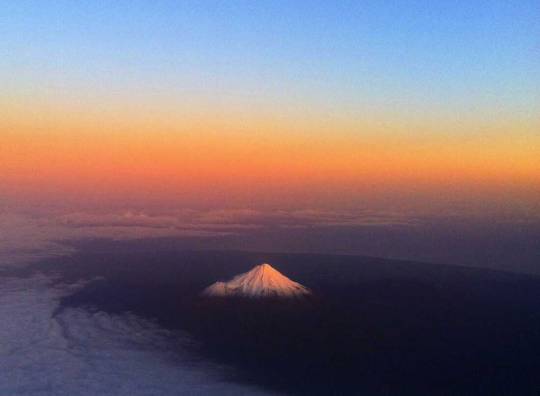
Why is this mountain special?
"The mountain has long been an honored ancestor, a source of physical, cultural and spiritual sustenance and a final resting place," Paul Goldsmith, the lawmaker responsible for the settlements between the government and Māori tribes, told Parliament in a speech on Thursday.
But colonizers of New Zealand in the 18th and 19th centuries took first the name of Taranaki and then the mountain itself. In 1770, the British explorer Captain James Cook spotted the peak from his ship and named it Mount Egmont.
In 1840, Māori tribes and representatives of the British crown signed the Treaty of Waitangi — New Zealand's founding document — in which the Crown promised Māori would retain rights to their land and resources. But the Māori and English versions of the treaty differed — and Crown breaches of both began immediately.
In 1865, a vast swathe of Taranaki land, including the mountain, was confiscated to punish Māori for rebeling against the Crown. Over the next century hunting and sports groups had a say in the mountain's management — but Māori did not.
"Traditional Māori practices associated with the mountain were banned while tourism was promoted," Goldsmith said. But a Māori protest movement of the 1970s and '80s has led to a surge of recognition for the Māori language, culture and rights in New Zealand law.
Redress has included billions of dollars in Treaty of Waitangi settlements — such as the agreement with the eight tribes of Taranaki, signed in 2023.
How will the mountain use its rights?
"Today, Taranaki, our maunga, our maunga tupuna, is released from the shackles, the shackles of injustice, of ignorance, of hate," said Debbie Ngarewa-Packer, a co-leader of the political party Te Pāti Māori and a descendant of the Taranaki tribes, using a phrase that means ancestral mountain.
"We grew up knowing there was nothing anyone could do to make us any less connected," she added.
The mountain's legal rights are intended to uphold its health and wellbeing. They will be employed to stop forced sales, restore its traditional uses and allow conservation work to protect the native wildlife that flourishes there. Public access will remain.
Do other parts of New Zealand have personhood?
New Zealand was the first country in the world to recognize natural features as people when a law passed in 2014 granted personhood to Te Urewera, a vast native forest on the North Island. Government ownership ceased and the tribe Tūhoe became its guardian.
"Te Urewera is ancient and enduring, a fortress of nature, alive with history; its scenery is abundant with mystery, adventure, and remote beauty," the law begins, before describing its spiritual significance to Māori. In 2017, New Zealand recognized the Whanganui River as human, as part of a settlement with its local iwi.
How much support did the law receive?
The bill recognizing the mountain's personhood was affirmed unanimously by Parliament's 123 lawmakers. The vote was greeted by a ringing waiata — a Māori song — from the public gallery, packed with dozens who had traveled to the capital, Wellington, from Taranaki.
The unity provided brief respite in a tense period for race relations in New Zealand. In November, tens of thousands of people marched to Parliament to protest a law that would reshape the Treaty of Waitangi by setting rigid legal definitions for each clause. Detractors say the law — which is not expected to pass — would strip Māori of legal rights and dramatically reverse progress from the past five decades.
-via NPR, January 31, 2025
--
Note: The article doesn't get fully into the implications of the broader, global "rights of nature" movement (of which this is part), which is powerful tool for not only recognizing Indigenous ways of relating to the world, but also preventing ecological damage.
Examples of rights of nature include rivers having the right to not be polluted, etc. Powerful tool for leveraging the courts and legal frameworks against environmental destruction.
#maori#maori culture#aotearoa#new zealand#rights of nature#sacred land#land back#first nations#mountains#good news#hope
3K notes
·
View notes
Text
Want to materially support indigenous rights within 10 minutes?
Make a submission against the New Zealand's government's proposed bill that will take away Māori rights. You don't need to be from Aotearoa New Zealand to submit.
You have until 7th January New Zealand time.
FAQ about the bill here, from a trustworthy organisation.
Guide to writing a submission here. (It's more aimed at people based in Aotearoa, but is still valuable.)
Submit here.
Examples of international submissions. Please make it your own, as repeated submissions will not be counted.
In 2025, we should all strive to support indigenous rights, and here's an easy way to do that.




2K notes
·
View notes
Text
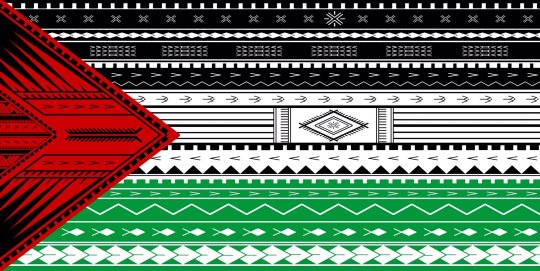
Palestine flag with Samoan motifs & patterns representing unity & solidarity designed by Samoan-kiwi great artist Michel Mulipola (@bloodysamoan) whose great-grandfather was part of Samoan independence Mau movement (Sāmoa for Sāmoans).
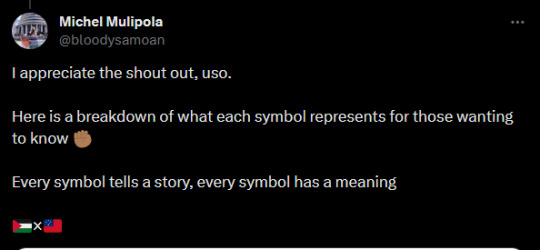
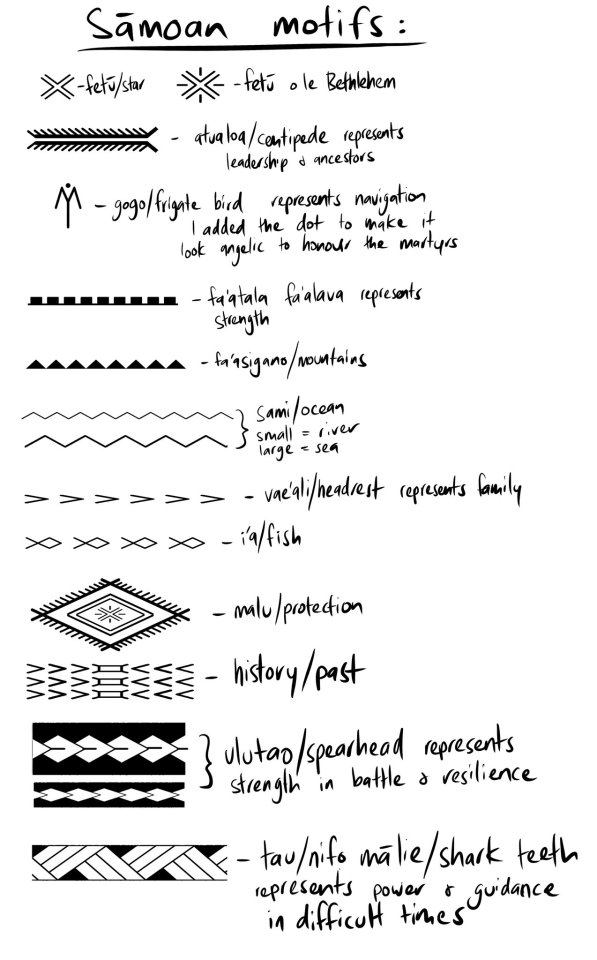
13K notes
·
View notes
Text
So for anyone who doesn’t keep up with nz politics, which i’m assuming is most of you, our new radical right government have decided one of their main aims of their term will be to re-interpret the Treaty of Waitangi.
The Treaty is an agreement between Maori and the Crown, now the NZ government. It is the founding document of new zealand and is recognised as a constitutional document today; it is the only treaty of its kind/time still honoured, and it is the steps we’ve taken through the Treaty to provide restitution and build an ongoing relationship with Maori and their iwi (tribes) that has allowed the relationship between Maori and the government to thrive where other indigenous groups have struggled to achieve recognition of their rights.
This is going to be entirely undone. Not only is this issue inflammatory and a threat to race relations in Aotearoa, leaked documents show the proposed “reinterpretation” wants to negate pretty much the entirety of the legal rights provided to Maori under the treaty. For example, the treaty article that guarantees land rights for Maori will be reinterpreted to guarantee land rights for “all New Zealanders”. Which means this article would be essentially meaningless for Maori.
By removing Maori from the context they are trying to put Maori on an “equal footing” with all New Zealanders; they are riding the idea that Maori have special rights and privileges above that of the average New Zealander. Obviously this is bullshit but it’s effective rhetoric and there’s a grain of truth to in that the extent of Maori rights hadn’t been clearly defined due to the ongoing nature of the process. So this has got a lot of people with a poor grasp of the issues very upset and baying for change.
There is a hui (meeting) being held today for all the iwi to begin discussions of how Maori will respond to this. New Zealand politics isn’t very interesting usually, but our progress on indigenous rights, until now, has been absolutely ahead of the field. If you care about indigenous rights globally, you should care about this, because in the same way Australia’s referendum loss has spurred on this action, the loss of rights here will spur other right wing governments to be similarly bold to their own indigenous groups.
Indigenous rights in New Zealand are under attack. They are meeting today to discuss it, and New Zealand will be listening, but I want the world to be listening. Because our government needs the shame of being called out by more than just the people who they’ve already decided don’t vote for them.
Maori have a long and proud history of fighting for their rights, and they’ll do it again here. And I’ll be on the pickets beside them, but there’ll be plenty of my own pickets to attend, because this government is radical in every sense of the word.
So please, even if you’re very far away, stand behind them in this. Keep your eyes on us. Amplify their voices. Don’t let the racism drown them out.
18K notes
·
View notes
Text

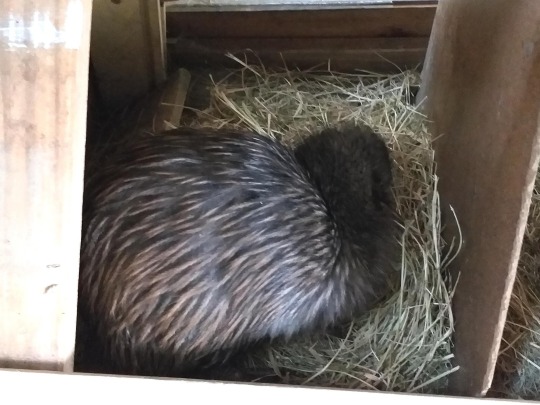
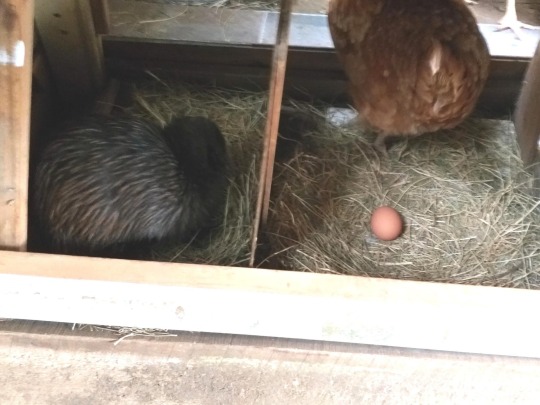
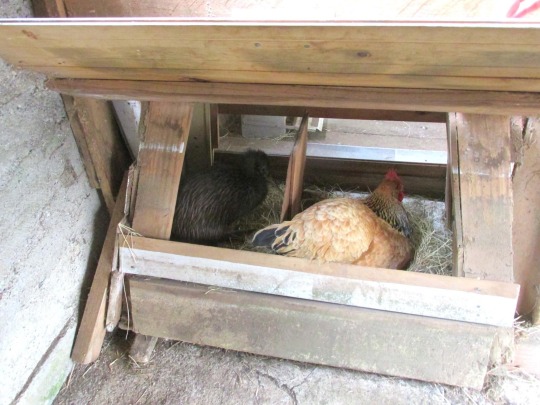
11K notes
·
View notes
Text




Close enough, welcome back Rosetta Stone
3K notes
·
View notes